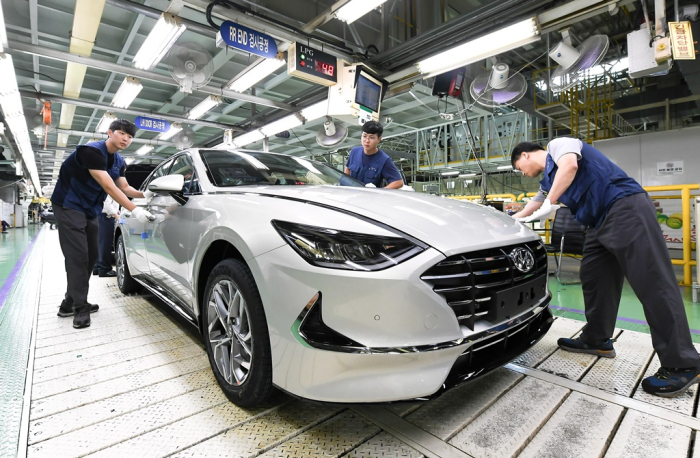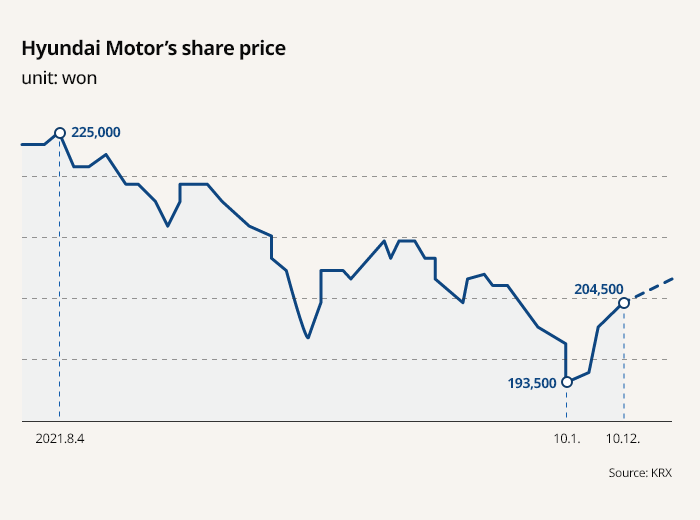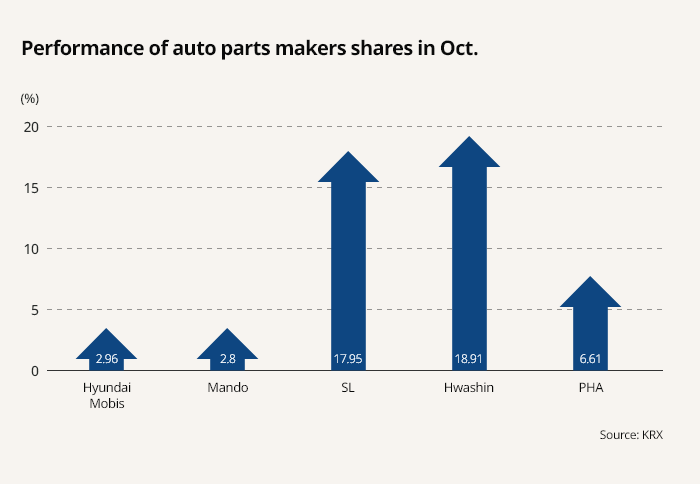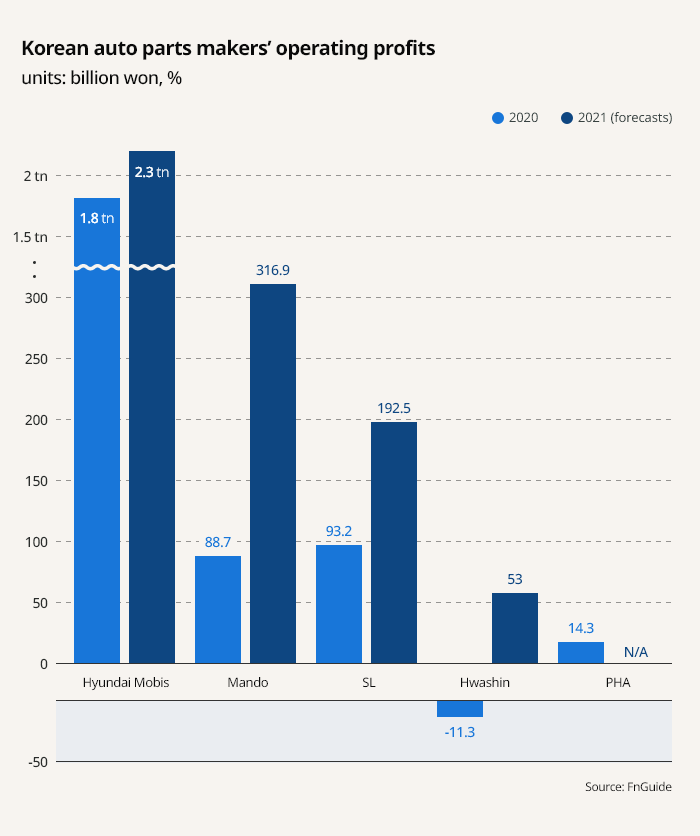Automobiles
Korean auto shares shine in gloomy stock market
Hyundai MotorŌĆÖs stock hits one-month high, Kia touches three-week peak
By Oct 13, 2021 (Gmt+09:00)
3
Min read
Most Read
Samsung shifts to emergency mode with 6-day work week for executives


CJ CheilJedang to sell feed, livestock unit for $1.4 bn


Samsung Electronics' key M&A man returns; big deals in the offing


Affinity to buy SK Rent-a-Car at $572 mn, more deals expected


Keppel REIT to sell Seoul-based prime office T Tower



South Korean car shares overcame slides in the countryŌĆÖs stock markets as the automotive chip shortage is showing some signs of easing.
Global carmakers are expected to report poor earnings in the third quarter as the shortage thwarted production despite rising demand. Their shares, however, started rebounding as chip supply is expected to gradually improve from next year while their earnings in the July-September period have been reflected in stock prices, analysts said.
ATTRACTIVE STOCK PRICES
Shares in South KoreaŌĆÖs two largest automakers rose even as the broader Kospi lost ground on concerns over global inflation.
Hyundai Motor Co. jumped as high as 3.2% to 211,000 won ($176.4) early on Oct. 13, its highest point since Sept. 16. Kia Corp. also gained 2.6% to 84,300 won, its strongest since Sept. 24.
Their shares rose 2.3% and 1.2% in the first 12 days of the month, according to the Korea Exchange (KRX). During the period, the Kospi lost about 5%.

AutomakersŌĆÖ share prices are attractive as stocks in Asian carmakers underperformed competitors in the US such as General Motors Co. and Ford Motor Co. HyundaiŌĆÖs 12-month forward price-earnings ratio fell to 8.46 times, while KiaŌĆÖs ratio skidded to 6.59 times.
RELATIVELY FREE FROM CHINA SLOWDOWN
South Korean automakers are relatively free from worries about ChinaŌĆÖs economic slowdown. Hyundai and Kia have been reducing reliance on the worldŌĆÖs largest car market while increasing investment in other emerging countries.
ŌĆ£ChinaŌĆÖs car sales are falling not because of production interruption but because of slowing demand,ŌĆØ said Samsung Securities analyst Lim Eun-young. China is unlikely to provide active measures to support car demand since the government focuses more on easing income disparity, Lim added.
China accounts for less than 10% of Hyundai and KiaŌĆÖs global sales. But they expanded their market share in other emerging countries, becoming top automakers in Russia and Vietnam. They are the No. 2 player in India and No. 4 in Brazil.
ŌĆ£Emerging markets such as Russia and Brazil, on which Hyundai and Kia are focusing, are commodity-oriented economies,ŌĆØ Lim said. ŌĆ£The recent surge in commodity prices has led to an overall economic recovery. Demand for deferred consumption is also expected, given sluggish demand in the past five to six years.ŌĆØ
Global automobile demand remained healthy. The Manheim Used Vehicle Index, an indicator of overall car demand, hit a record high in September as consumers looked for second-hand cars since they could not buy new models due to production disruption.
PARTS MAKERS
Given the strong demand, auto parts makers are also predicted to benefit from the normalization of carmakers' production.
Samsung Securities recommended buying shares in small and medium-sized parts makers such as SL Corp., Hwashin Co. and PHA Co. that had been undervalued due to their heavy reliance on Hyundai and Kia.

ŌĆ£Mando, SNT Motiv and SL, which supply parts to North American carmakers such as GM and Ford, are forecast to report weak earnings. But they will recover if the shortage issues are resolved quickly, causing those automakers to rush for components,ŌĆØ said Shinhan analyst Jung Yong-jin.

Shares in South KoreaŌĆÖs auto industry are expected to regain momentum from stable electric vehicle production, Jung said.
ŌĆ£Hyundai and KiaŌĆÖs global EV market shares fell as disruptions in the production of electric motors delayed output of models that sit on the dedicated EV platform E-GMP,ŌĆØ Jung said. ŌĆ£An imminent normalization of E-GMP production is predicted to boost momentum from the related value chain,ŌĆØ he said, picking up Hyundai Mobis as a recommended stock.
Write to Jae-Yeon Ko at yeon@hankyung.com
Jongwoo Cheon edited this article.
More to Read
-
 AutomobilesChip shortage slams Korean carmakersŌĆÖ new car rollouts
AutomobilesChip shortage slams Korean carmakersŌĆÖ new car rolloutsOct 06, 2021 (Gmt+09:00)
3 Min read -
 AutomobilesHyundai, Kia take throne in Russia on decade of investment
AutomobilesHyundai, Kia take throne in Russia on decade of investmentSep 27, 2021 (Gmt+09:00)
2 Min read -
 AutomobilesCarmaker stocks hit speed bump of chip shortage, Delta variant
AutomobilesCarmaker stocks hit speed bump of chip shortage, Delta variantAug 20, 2021 (Gmt+09:00)
3 Min read -

-
 Foundry businessKorean foundry firm DB HiTek sets new Q1 sales record
Foundry businessKorean foundry firm DB HiTek sets new Q1 sales recordMay 17, 2021 (Gmt+09:00)
3 Min read -
 Factory suspensionGM Korea to halt 2 main plants next week on automotive chip shortage
Factory suspensionGM Korea to halt 2 main plants next week on automotive chip shortageApr 15, 2021 (Gmt+09:00)
2 Min read
Comment 0
LOG IN


